BAJAJ BROKING
Laxmi Dental IPO is Open!
Open a Free Demat Account
Trade Now, Pay Later with up to 4x
Track Market Movers Instantly
Share Market Today | Gift Nifty Hints Positive Market Opening, Range 23,300-23,800
Synopsis:
Today’s share market’s key updates include how SJVN inks Rajasthan renewable MoU; Wipro sets record date for bonus; Kenya cancels Adani deal; Tata Power, Afcons secure projects; FIIs net sell ₹5,320 crore.
Latest Market News
1. SJVN signs MoU with RajasthanGovt’s Energy Department for the development of renewable energy in the state.
2. Wipro fixes 3 Dec as the record date for the bonus issue.
2. Kenya cancels the $700 mn deal signed with a unit of the Adani Group to construct power transmission lines.
3. AfconsInfra declared the lowest bidder for a project worth ₹1,274 cr from Uttarakhand Project Development & Construction Corporation.
4. NSE Investments to sell up to 20.3% stake in Protean eGov via OFS.
5. Tata Power | The company has signed a MoU with the Asian Development Bank (ADB) at COP29 in Baku, Azerbaijan, to explore financing options for key energy infrastructure projects in India. It also includes financing for Tata Power's capital expenditure to strengthen its distribution networks. The total estimated cost of these projects is approximately US $4.25 billion.
6. Cash segment- FIIs net sell ₹5,320.68 crore while DIIs net buy ₹4,200.16 crore in equities yesterday (provisional).
AFCONS INFRASTRUCTURE LTD
Trade511.615.25 (3.07 %)
In-Depth Market Insights: Global Outlook, Derivatives & More
US Share Market News
Performance Overview:
US benchmark equity indices closed higher on Thursday as traders evaluated the latest economic data.
Sector-Specific Movements:
The Dow Jones Industrial Average rose 1.1% to 43,870.4, while the S&P 500 increased 0.5% to 5,948.7. The Nasdaq Composite changed a little at 18,972.4. Utilities led the gainers among sectors. Only communication services and consumer discretionary closed lower.
Other Asset Classes
Treasury Yields:
The US two-year yield rose 4.5 basis points to 4.35%, while the 10-year rate gained 1.8 basis points to 4.42%.
Currency:
The dollar index towards 107.01, not far off one-year high of 107.15.
Commodities:
West Texas Intermediate crude oil rose 2% to $70.10 a barrel Thursday amid a "significant escalation" in the Russia-Ukraine conflict.
Gold rose 0.8% to $2,672.40 per troy ounce, while silver fell 0.5% to $30.85 per ounce.
Asian Markets
General Trends:
Asian equities rose Friday following gains on Wall Street as investors shook off initial concerns over Nvidia Corp.’s revenue outlook.
Specific Index Performance:
Shares in Australia and Japan advanced.
The Nikkei 225 Index rose 0.7% to around 38,300, while the broader Topix Index gained 0.6% to 2,699 as investors digested Japan's latest consumer inflation data. The data revealed that Japan’s headline inflation rate slowed to a nine-month low of 2.3% in October.
Bitcoin set a fresh high, climbing past $98,000.
The S&P/ASX 200 Index rose 0.9% to approach 8,400 on Friday, rebounding from a two-day slump, with nearly all sectors contributing to the rally.
India Market Outlook
GIFT Nifty Projection:
Gift Nifty suggests a positive opening for the Indian markets and is likely to consolidate in the broad range of 23,300 - 23,800.
Market in Previous Session:
Indian benchmark indices ended in red on November 21, with Nifty closing below the 23,400 mark as allegations of bribery against Gautam Adani in the US have led to sharp declines in equities, bonds, and related securities, dampening market sentiment and reigniting concerns over corporate governance.
The market began on a weak footing due to unfavourable global cues and extended its losses throughout the day, driven by intensifying geopolitical tensions.
The Sensex dropped 422.59 points (0.54%) to finish at 77,155.79, while the Nifty shed 168.60 points (0.72%) to close at 23,349.90.
Sectorally, Energy, FMCG, Oil & Gas, PSU Bank, Media, Auto, and Metal indices saw declines of 1-2%, whereas the Realty index gained 1%, and the I.T index rose 0.5%.
BSE Midcap index is down 0.3 per cent and the small-cap index is down 0.6 per cent.
Nifty Short-Term Outlook:
The Index continues to form lower highs and lower lows. Forming another bear candle in the daily chart highlights the bears' strong dominance.
Nifty is currently at the lower band of the last 4 sessions consolidation range 23250-23800. We expect the index to extend the consolidation. A breakout or breakdown will signal a further directional moment.
A trend reversal would require the Index to overcome the critical resistance at 23,800. Until then, the trend remains weak, with a break below today's low potentially opening the path to the next key support level at 23,000.
Intraday Levels:
Nifty: Intraday resistance is at 23,240 followed by 23,000 levels. Conversely, downside support is located at 23,480, followed by 23,550.
Bank Nifty: Intraday resistance is positioned at 50,000, followed by 49,650, while downside support is found at 50,800, followed by 51,000.
Derivative Market Analysis
Nifty:
The highest call OI is positioned at 24000 followed by the 23500 level, whereas the highest put OI is positioned at the 23000 level followed by the 22500 level.
Aggressive call and put writing was seen at 23300 strike making it a crucial level to watch for. Call writers were active between 23300 and 23500 making it an important resistance zone. If Nifty manages to cross 23500, the index can march towards 23800.
According to option chain analysis, a broader range for Nifty is 23000 and 23500.
The Nifty put-call ratio is now positioned at 0.94.
Bank Nifty:
The highest call OI is positioned at 52000 followed by the 51000 level, whereas the highest put OI is positioned at 49500 followed by the 49000 level.
In the previous session, put writers were active below 50000 making it an important support. On the higher end, we saw call OI addition at 51000 making it a crucial resistance.
According to option chain analysis, an immediate range for Bank Nifty is 50000 and 51000.
The Bank Nifty put-call ratio remains unchanged at 0.91.
Stay on top of the latest market news with Bajaj Broking’s insights. Our point-to-point expert analysis digs deep into the surface, empowering you with a unique perspective on domestic and global stock market events. Get all the current share market news, including US share market updates in one place and make wise investment decisions.
Disclaimer: Investments in the securities market are subject to market risk, read all related documents carefully before investing.
This content is for educational purposes only. Securities quoted are exemplary and not recommendatory.
For All Disclaimers Click Here: https://bit.ly/3Tcsfuc
- Related Articles
- Top Articles

Gold Rate Today | 15 January 2025 | Gold Price in India
15 Jan, 2025 | 40 Min. read

Delhi Court Discharges JSW Steel in Corruption Case; HC Clears Monnet Takeover
15 Jan, 2025 | 2 Min. read
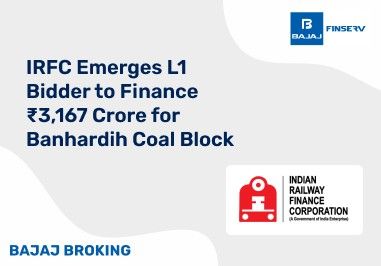
IRFC Emerges L1 Bidder to Finance ₹3,167 Crore for Banhardih Coal Block
15 Jan, 2025 | 2 Min. read
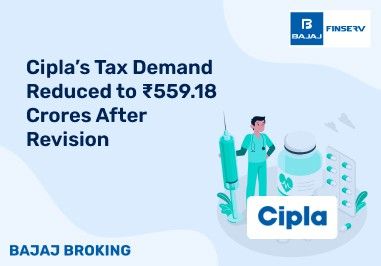
Cipla’s Tax Demand Reduced to ₹559.18 Crores After Revision
15 Jan, 2025 | 2 Min. read
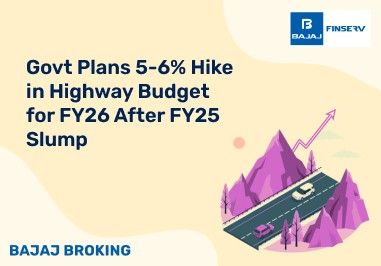
Govt Plans 5-6% Hike in Highway Budget for FY26 After FY25 Slump
15 Jan, 2025 | 2 Min. read

Rikhav Securities IPO- Key Objective & Deep Analysis
15 Jan, 2025 | 5 Min. read

HCL Tech expands partnership with Microsoft to transform contact centres
14 Jan, 2025 | 2 Min. read

BEL secures new orders worth Rs 561 crore, boosting FY25 order book
14 Jan, 2025 | 2 Min. read

ITI Ltd secures Rs 64 crore contracts for Wi-Fi and CCTV systems
14 Jan, 2025 | 2 Min. read
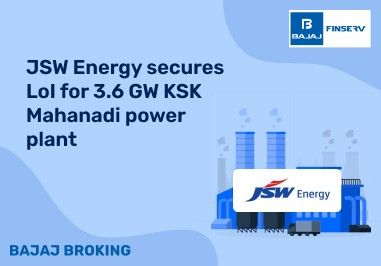
JSW Energy secures LoI for 3.6 GW KSK Mahanadi power plant
14 Jan, 2025 | 2 Min. read

Biocon Biologics’ Johor Bahru Facility Receives FDA VAI Classification
13 Jan, 2025 | 2 Min. read

Interarch Secures ₹221 Crore Projects in Semiconductors & Energy Storage
13 Jan, 2025 | 2 Min. read

RBI Launches ULI: Transforming Loan Access
August 27, 2024 | 4 Min. read

Textile Sector in India
September 20, 2024 | 5 Min. read
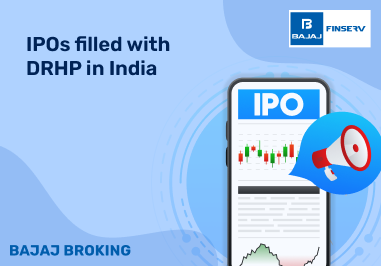
List of IPOs with DRHPs Filed
November 30, 2023 | 3 Min. read

Aditya Birla Group
September 28, 2023 | 10 Min. read

Bajaj Housing Finance Ltd IPO: Things Smart Investors Need to Know
September 05, 2024 | 4 Min. read
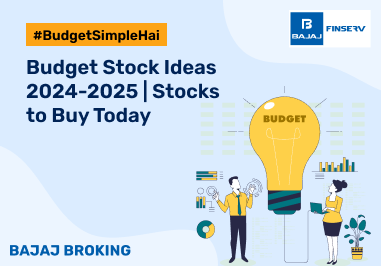
Budget Stock Ideas 2024-2025 | Stocks to Buy Today
July 24, 2024 | 4 Min. read

IPO Eligibility Criteria : Full Details
March 15, 2024 | 6 Min. read

What Is the Lock-In Period in IPOs?
October 18, 2023 | 6 Min. read

Godfrey Phillips Announces 2:1 Bonus Shares
September 16, 2024 | 7 Min. read

Jindal Group- A Comprehensive Analysis
September 27, 2024 | 7 Min. read
Read More Blogs
Our Secure Trading Platforms
Level up your stock market experience: Download the Bajaj Broking App for effortless investing and trading



